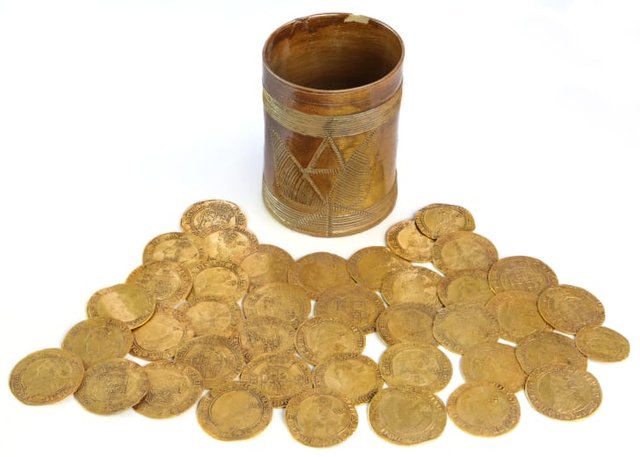A house refurbishment in northern England has uncovered a trove of gold coins, which could be worth up to £250,000 ($290,000) at auction next month.
The discovery is one of the biggest hoards of 18th century English gold coins ever uncovered in Britain, according to auction house Spink & Son in a press release sent to CNN on Thursday.
While renovating their kitchen in July 2019, residents unearthed a salt-glazed earthenware cup burrowed underneath the concrete and floorboards of their home in Ellerby, North Yorkshire.
The cup, described as being no larger than a soft-drink can, contained more than 260 gold coins dating from 1610 to 1727. The stash of coins has an estimated value of £100,000 ($116,00) in today's spending power, auctioneers said.
Gregory Edmund, an auctioneer with Spink & Son, said the remarkable trove is unlike any find in British archaeology or like any coin auction in living memory.
"It is a wonderful and truly unexpected discovery from so unassuming a find location," Edmund said in the press release.
"This find of over 260 coins is also one of the largest on archaeological record from Britain, and certainly for the 18th century period," he added.
 The discovery of more than 260 gold coins dating back to the 17th and 18th centuries is "one of the largest on archaeological record from Britain," according to auctioneers Spink & Son
The discovery of more than 260 gold coins dating back to the 17th and 18th centuries is "one of the largest on archaeological record from Britain," according to auctioneers Spink & Son
"The coins almost certainly belonged to the Fernley-Maisters, Joseph and Sarah who married in 1694," reads the press release.
According to Spink & Son, the Maisters were an influential mercantile family from the 16th century to the 18th century. They traded iron ore, timber and coal from the Baltic states and several generations took up posts as lawmakers in the early 1700s.
Their family line dwindled soon after the couple died, which is presumably why the coins were never retrieved, the auction house added.
Meanwhile, Edmund said the findings reflect the £50 and £100 coins that were used at the time.
"Joseph and Sarah clearly distrusted the newly-formed Bank of England, the 'banknote' and even the gold coinage of their day because they (chose) to hold onto so many coins dating to the English Civil War and beforehand," he added.
"Why they never recovered the coins when they were really easy to find just beneath original 18th century floorboards is an even bigger mystery, but it is one hell of a piggy bank."
Authors get paid when people like you upvote their post.
If you enjoyed what you read here, create your account today and start earning FREE STEEM!
If you enjoyed what you read here, create your account today and start earning FREE STEEM!
Sort Order: Trending
Loading...